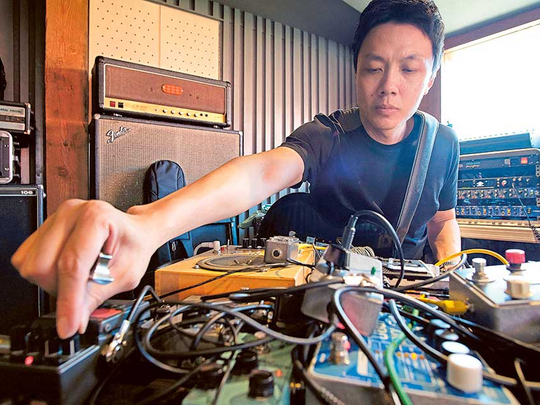
Asia’s music — like its politics — remains full of barriers, with historical tensions casting a long shadow. But a group of Asian artists has discovered harmony in, of all places, noise.
Calling themselves the Far East Network, the quartet loosely revolves around Otomo Yoshihide, a leading force in Japan’s onkyo-kei scene of experimental noise that emerged in Tokyo in the late 1990s.
The ensemble has been performing together periodically since 2008 but has come to New York to record for the first time, hoping to produce an album.
In a studio resembling a treehouse in Brooklyn’s waterfront Red Hook neighbourhood, Otomo meticulously manipulated his guitar’s sound, sticking in alligator clips from a hardware store and licking his finger and rubbing it on the instrument’s body, producing a gentle squeaking sound with the aid of his pedals.
Otomo Yoshihide of Far East Network. (Image Credit: AFP)
Next to him, Singaporean avant-garde musician Yuen Chee Wai pressed a hard brush against the strings of his own guitar on his lap.
Ryu Hankil, a South Korean artist with no formal musical training, took to his laptop while Yan Jun of China, whose background is in poetry and multimedia, manned the mixing board.
In a jam session akin to free jazz, the Far East Network set off with no script, producing noises that are at times robotic or caustic, frequently jarring, and rarely have traditional rhythmic structure.
After finishing a track, Otomo remarked that the sound of the breeze may have come in through the door, which was ajar — and he smiled approvingly, wondering whether it would enhance the music.
“I think the only way is improvisation, because we all play in different ways,” Ryu said afterwards.
The Far East Network decided to record in New York after an invitation from the Japan Society, where the ensemble will perform on Saturday.
The concert will include an immersive session as the Far East Network plays in the foyer and the audience walks around them, a concept the artists describe as letting each person be his or her own sound engineer.
Laughing at differences
The four artists have formed an easy friendship, joking around or discussing food options during breaks. But their meeting may never have happened.
The Far East Network took shape in 2008 when Otomo played the Mimi festival of innovative music in Marseille, France, and was asked to do a project with other Asian musicians.
“Before 10 years ago, it was very difficult to meet musicians from other Asian countries, particularly before internet culture,” Otomo said.
The ensemble has since played together around Asia and Europe, but the Japan Society concert marks its North American debut.
While Otomo is well-known in underground circles, the artists say they had limited exposure to the scenes in each other’s countries.
Japan has rocky relations with China and South Korea, over issues linked to wartime history.
But the artists of the Far East Network show little of that baggage, saying they like to tease one another about the stereotypes associated with their countries.
“Yeah, yeah, we hate each other,” Otomo said with a laugh when asked about the lingering disputes.
“The best way of solving conflicts is to laugh at it,” said Yuen, the Singaporean. “We laugh at the stereotypical perceptions you have of a particular culture or race, but yet we don’t take ourselves too seriously.”
Barriers for artists
Besides history, Asian musicians face other obstacles to collaboration including a lack of common language.
The four artists initially communicated by handing one another notes in Chinese characters — which are understood by Japanese speakers and many Koreans — although all four are now comfortable in English.
Unlike Europeans who can move to Berlin, London or other music hubs with minimal hassle, Asians often need visas to travel within the continent and, the artists say, rarely find outside funding to do so.
One growing area of musical cooperation in Asia is Korean girl bands, whose producers have increasingly brought in singers from neighbouring countries. The example amuses members of the Far East Network, who joke that they were the forebears of such chart-topping bubblegum pop.
While four artists making noise would prove an unlikely model for diplomats, the artists said that they at least can show an example.
“I would like to see music itself as a type of politics,” said Yan, the Chinese artist.
Musicians can “serve as a balance to another kind of politics,” he said.













